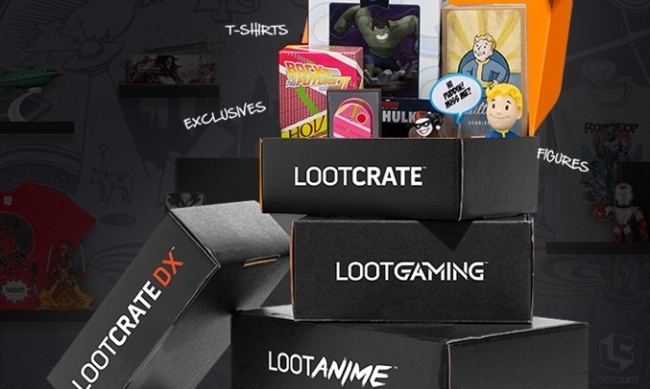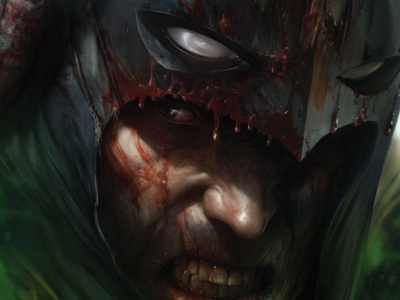Loot Crate, which came out of nowhere to take the geek world by storm with its subscription gift-box service, has been finding out that overnight success can sometimes lead to a hangover. A long feature story in the Los Angeles Times describes the company’s recent troubles after a meteoric rise, including accounts of cratering morale following a round of layoffs that claimed more than a quarter of the workforce. Though Loot Crate was profitable last quarter, the story paints a troubling picture of a company that grew too fast and has faced consistent operational problems, many of its own making.
Loot Crate was founded in 2012 by a team of college students led by current CEO Chris Davis. It was able to remain revenue positive through its first four years due to rapid subscriber growth and the ability to expand its offerings in the geek culture space. But then, reality bit.
You can always tell the vultures are circling when the snack shelves run dry. The story reports that Loot Crate had difficulty scaling up its workforce, keeping customers satisfied, and working well with the big brands in the space like Disney, HBO and Netflix. Employees were recruited on promises of working in a fun, exciting startup with a potential big payday once the company got acquired or went public. But those promises started to ring hollow as conditions within Loot Crate deteriorated and problems of management, execution and financial discipline began to surface. According to the LA Times:
Employees went home earlier and casual conversation on the company’s internal chat app Slack declined. Snack shelves weren’t stocked as often, or perhaps with all the new hires the food just ran out sooner. Bathrooms grew dirty. Bonuses arrived as stock, not cash. Negative reviews on jobs site Glassdoor piled up. A promised new office to replace the company’s Lincoln Heights space remains indefinitely delayed. Adding bodies was treated as a solution to deep problems, current and former employees say.
By mid-2016, following a painful round of layoffs, some corporate restructuring and the addition of some seasoned hands on the Board of Directors, things started turning around. Conditions no longer sound as dire, although the article suggests Loot Crate still faces some fundamental problems related to its business model, such as difficulties in liquidating unsold inventory and the ability to accurately forecast upcoming trends in popular culture and user demand.
No margin for error. Loot Crate is in a tricky position. It, or any company that takes over as a leader in the space, will always have a precarious market position because the gift box business seems difficult to protect from competition, particularly when serving a market of fickle, discriminating fans and collectors rather than ordinary consumers. Loot Crate moved first and fast in the geek culture space, signing up a bunch of exclusives with top brands and building out its subscription list, but it wasn’t long before others started moving in with more specialized offerings and strong brands of their own.
The Times story reports that "Davis saw the company’s business model validated with Unilever’s $1-billion acquisition last summer of Dollar Shave Club, a Los Angeles razor brand that had amassed 3.2 million subscribers." If so, that seems misguided, and indicative of some of the company’s problems. Razor blades, despite efforts to differentiate through aggressive branding, are commodities; one is typically as good as another. A competitor who can offer greater convenience and lower prices is liable to take over the whole market overnight.
The value of geek swag, however, is in the eye of the collector. Some fans are acquisitive just to hoard more stuff, but in general, the market is more discerning. Even hoarder-collectors know desirable stuff from junk. They are also specialized. A big toy fan may have zero interest in comics and videogames, even if they feature properties they enjoy. That always leaves a market opening for someone with a little bit narrower focus or a little bit better taste and foresight.
If you combine this fragility with difficulties in executing on things like staffing, logistics and product fulfillment, as described in the Times piece, it makes it even harder to keep the wheels from falling off.
Loot Crate is starting from a good place: 650,000 subscribers, $165 million in revenue in 2016, nearly 250 employees. If they are not careful, that’s just a loftier perch from which to fall. However, it sounds like they are taking steps to address the problems.
Want to be the next Loot Crate, or avoid being the next Loot Crate? OK, time for some shameless promotion here. If you are interested in the cool and interesting world of pop culture startups, I’ll be hosting two panels later this month at San Diego Comic-Con.
At 3pm on Friday, July 21, join me for our second annual Pop Culture Shark Tank, where entrepreneurs pitch ideas for businesses in comics, games, media, geek merchandise and geek-oriented technology to our all-star panel, including Ted Adams (co-founder/CEO, IDW Entertainment), Suzy Ryoo (VP, Technology for Atom Factory, an LA-based venture capital firm specializing in entertainment and media), and David Steinberger (co-founder/CEO, comiXology). It’s a unique opportunity to get attention, feedback, and maybe even some opportunities for investment and partnership. If you want to pitch, shoot me a note on Twitter (@robsalk); otherwise, come on by and watch the competitors duke it out.
On Saturday, I’ll be moderating another panel also featuring Ted Adams and David Steinberger, this time joined by Valiant’s CEO Dinesh Shamdisani and Maytai Gilboa of EMET, discussing their experiences as successful comics entrepreneurs. These are four of the top business minds in comics today; don’t miss a chance to learn from their experiences navigating the very tricky path from cool idea to successful business.
The opinions expressed in this column are solely those of the writer, and do not necessarily reflect the views of the editorial staff of ICv2.com.
Rob Salkowitz (@robsalk) is the author of Comic-Con and the Business of Pop Culture.

Column by Rob Salkowitz
Posted by Rob Salkowitz on July 3, 2017 @ 5:29 pm CT
MORE COMICS
From Dynamite Entertainment
August 8, 2025
Here's a preview of Space Ghost #1, published by Dynamite Entertainment.
Dark, Erotic Manga Based on Short Story by Edogawa Rampo
August 8, 2025
Maruo brings his signature “erotic grotesque” style to a dark tale by writer Edogawa Rampo.
MORE COLUMNS
Column by Jeffrey Dohm-Sanchez
August 7, 2025
ICv2 Managing Editor Jeffrey Dohm-Sanchez lays out the hotness of Gen Con 2025.
Column by Rob Salkowitz
August 5, 2025
In this week's column by Rob Salkowitz, he looks at the industry's biggest show, held in the midst of some existential issues.








